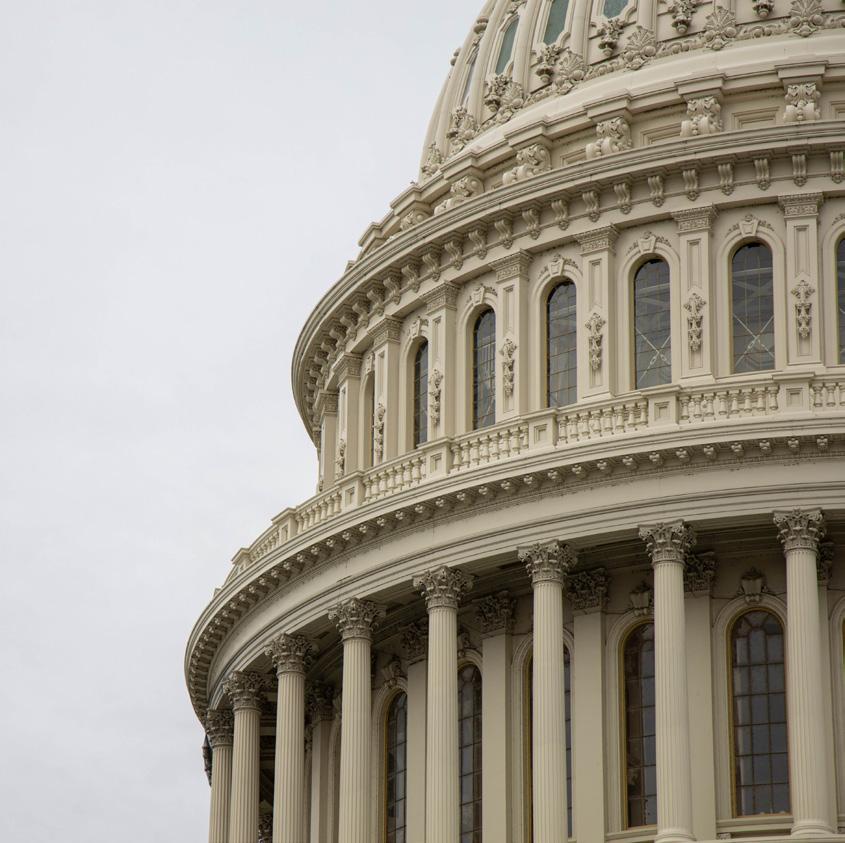
3 minute read
INFRASTRUCTURE FUNDING: HOLDING STEADY AMONG THE STORMS
Despite tornados and record flooding moving east and political storms building in Washington, New Jersey and the highway industry continues to reap the benefits of the massive $1.2 trillion Infrastructure Investment and Jobs Act (IIJA) passed by Congress two years ago. While failure to act on the debt limit may stall or significantly harm the economy, highway work should continue at its record pace.
In a recent statement before Congress, the American Road & Transportation Builders Association (ARTBA) Chair Paula Hammond said that more than 36,000 federal transportation improvement projects have moved forward in the past 16 months due to the IIJA investment. Hammond acknowledged inflation continues to have impacts on the states’ ability to deliver projects.
“Increased material costs and supply chain challenges undoubtedly have had a dilutive impact on the law’s investments,” Hammond said. But she added, “It’s also clear this situation would have been dramatically worse had Congress opted for another flat-funded extension of surface transportation programs. Our analysis shows there has been real market growth over the last year.”
Congress also recently heard a favorable report from U.S. Department of Transportation (USDOT) Secretary Pete Buttigieg who defended the proposed fiscal year 2024 budget for his agency and its modal divisions. The main highlight of the president’s continued commitment to expanding protections for New Jersey employees who are involved in labor disputes. For employers, this change indicates that a work stoppage will be more expensive and potentially last longer since employees will have more ready access to unemployment benefits, and may act as an incentive to resolve work stoppages promptly.
For over 30 years, Genova Burns has partnered with companies, businesses, trade associations, and government entities on matters in New Jersey and the greater northeast corridor between New York City and Washington, D.C. If our firm can be of assistance, please reach out to Jennifer Roselle at 973-646-3324 or jroselle@genovaburns.com.
BY NICK YAKSICH
FY 2024 budget request, according to analysis by the American Association of State Highway and Transportation Officials (AASHTO), is that funding levels authorized under the IIJA continue unimpeded, with $80.3 billion provided via contract authority for trust fund programs and $36.8 billion in advance appropriations.
Concurrently, the administration is requesting $27.8 billion in discretionary budget authority from the General Fund, which is traditionally where congressional appropriators focus as part of the Transportation, Housing, and Urban Development (THUD) annual funding package.
Specifically, AASHTO said the Biden administration seeks to cut out congressional earmarks and zero out certain General Fund supplements to the Federal Aviation Administration, Federal Highway Administration, and Federal Transit Administration formula programs that have been the norm in recent years. At the same time, the president seeks to ramp up funding for USDOT’s Mega discretionary grants programs, various Federal Railroad Administration programs, and FTA Capital Investment Grants, with a net discretionary funding reduction of $882 million in FY 2024 compared to FY 2023.
Buttigieg added that “unprecedented funding” from the IIJA is helping “modernize and improve” the nation’s infrastructure at a rapid pace and that the proposed FY 2024 budget for USDOT will help support that momentum.
“Shovels are hitting the ground on new projects all over the country. To date, we have announced over $200 billion for over 23,000 projects nationwide, and we are continuing to get funding to communities as swiftly as we responsibly can,” he said. “Aside from getting money out the door for more good projects, we’re also using our regulatory and enforcement authorities to protect and advocate for the traveling public. In short, there’s a great deal of work underway, and a great deal yet to be done.”
There is one significant IIJA provision implementation challenge facing the highway industry: the Build America, Buy America Act (BABA). ARTBA supports the clear congressional intent to grow domestic manufacturing capacity in the long-term. Their concern relates to the potential for short-term disruptions of projects emanating from the IIJA’s new requirements in this area.
For more than 40 years, Buy America has required a domestic manufacturing process for iron, steel, and certain manufactured products permanently incorporated into federal-aid highway and transit projects. The IIJA expanded Buy America coverage to five categories of construction materials (non-ferrous metals, plastic, polymer-based products, glass, lumber, and drywall). After USDOT deferred this new requirement for six months, it took effect on Nov. 10, 2022. At the same time, the department proposed narrow waivers from Buy America requirements for items falling under modest de minimis thresholds and for the smallest of federal-aid projects. It also proposed (and finalized on January 30) a waiver of the construction materials requirement for projects in advanced stages of procurement or for which contracts were already in place. More than 16 months following the IIJA’s enactment, many of the parameters for Buy America implementation remain unsettled, underscoring industry’s concerns about potential disruption of projects.

So with the storm clouds fading and warm weather approaching, the influx of federal infrastructure investment should produce a banner year for contractors and provide users a safer and more efficient transportation system.








